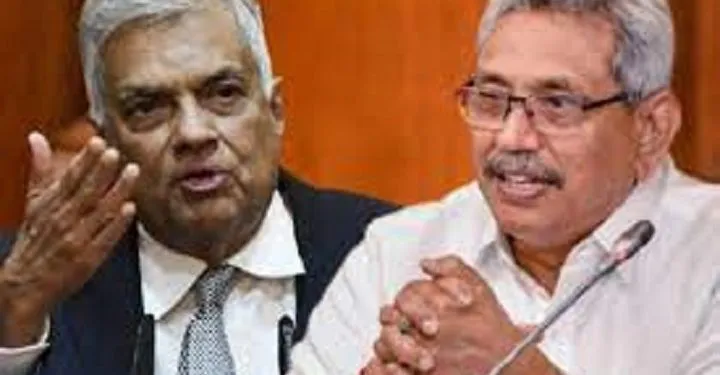The ruling SLPP parliamentary group should intervene to make President Ranil Wickremesinghe examine the draft Constitution formulated by the nine-member committee appointed by President Gotabaya Rajapaksa’s Cabinet-of-Ministers, rebel SLPP List MP Gevindu Cumaratunga said yesterday (15).
President’s Counsel Romesh de Silva headed the committee.
Having elected UNP leader Wickremesinghe in July last year as the President to complete the remainder of the then President Gotabaya Rajapaksa’s five-year term, the SLPP couldn’t remain silent on their own initiative, Cumaratunga said.
Responding to a query raised by The Island, the leader of civil society group Yuthukama stressed that the SLPP received two mandates at the Nov. 2019 presidential and Aug. 2020 parliamentary polls to introduce a new Constitution.
President Wickremesinghe should under no circumstances implement the 13th Amendment to the Constitution or contemplate going beyond that particular amendment, the first time entrant to Parliament said.
Questioning the President’s Office’s request for political parties to submit their recommendations, regarding the 13th Amendment, by 15th August, MP Cumaratunga said that the SLPP owed an explanation regarding its failure to take up the issue at hand with the President.
The committee announced by the then Justice Minister Ali Sabry, PC, comprised Gamini Marapana P.C., Manohara de Silva P.C., Sanjeewa Jayawardena P.C., Samantha Ratwatte P.C., Prof. Naazima Kamardeen, Prof. A. Sarveswaran, Prof. Wasantha Seneviratne and Prof. G.H. Peiris.
According to the committee, the draft that had been finalized in March 2022 was handed over to the then President Gotabaya Rajapaksa in April though it was never subject to public discussion. Both Sinhala and English copies were handed over to the President while the Legal Draftsman was requested to translate it to Tamil.
Of the political parties represented in Parliament, the main Opposition SJB and President Wickremesinghe’s party the UNP haven’t made representations to Romesh de Silva’s Committee. In spite of the Joint Legal Secretaries of the SJB meeting the Chairman of the Committee to work out modalities, the anticipated meeting didn’t take place, sources said.
The Committee received representations from delegations led by Basil Rajapaksa (SLPP), R. Sampathan (TNA), Dinesh Gunawardena (MEP), Udaya Gammanpila (PHU), Wimal Weerawansa (JNP), Tiran Alles (UPP), Vasudeva Nanayakkara (DLF), Anura Kumara Dissanayake (JJB), Raja Collure (Socialist Alliance), Dew Gunasekera (CP), Nimal Siripala de Silva (SLFP), Rushdi Habeeb (ACMC), Douglas Devananda (EPDP), Bandula Chandrasekera (JHU), Mano Ganesan (TPA), V. Radhakrishnan (UPF), Sivanesathurai Chandrakanthan (TMVP), Senthil Thondaman (CWC), Prof. Tissa Vitharana (LSSP), C.V. Wigneswaran (TMTK) and Asanka Navaratne (SLMP).
About a week before President Rajapaksa fled the country, amidst violent protests, the Committee planned to address the media regarding the new Constitution at the Presidential Secretariat. However, the media briefing was cancelled at the eleventh hour.
The committee has been divided over the 13th Amendment to the Constitution, enacted in 1988, in the wake of the Indo-Lanka Accord, signed in the year before.
The majority of Romesh de Silva’s Committee has not endorsed the Provincial Council, introduced in terms of the 13th Amendment, whereas Prof. A. Sarveswaran disagreed with the relevant Chapter (XXII) that he asserted deprived Provincial Council the powers enjoyed under the present Constitution, thereby affected reconciliation efforts.
Those who opposed asserted that the 13th Amendment undermined the unitary character thereby threatened the security of the State.
One member declared his opposition to the Provincial Council system and was not in favour of the provisions incorporated in Chapter XXII. That particular member has explained the grave danger in continuing with the existing system and the intensification of that threat in case of further devolution of power.
But two members supported the proposed Chapter XXII on the basis that
(i) No separate elections are held to constitute Provincial Councils,
(ii) Provincial Councils to consist of representatives of Local Authorities elected at the Local Authority Elections,
(iii) Provincial Councils to exercise executive power subject to the executive powers of the President and the Cabinet of Ministers
(iv) Power of the National State Assembly is not restricted in any manner with regard to any subject on which a Provincial Council has the power to make statutes.
The draft contained a full chapter on Provincial Councils. The Committee has suggested election of members to Provincial Councils and Local Authorities will be held on the same day in one election with each elector having two votes to elect a member for his electoral unit [ward] and a member for the Provincial Council from any one of the candidates in his local government area.


